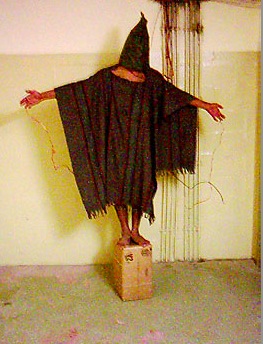In all the media debate about the Senate Intelligence Committee’s release, finally, of a heavily redacted report on officially sanctioned torture by the CIA and the US military during the Bush/Cheney administration and the so-called War on Terror, there has been little said about the reality that torture, as clearly defined in the Geneva Convention against Torture which went into effect in 1987, is flat-out illegal in the US as a signatory of that Convention.
During the Bush/Cheney years, administration lawyers like the reprehensible John Yoo (now, incredibly, a law professor at UC Berkeley), tried through shameless legal gymnastics, to provide legal cover for, and to legally authorize “enhanced interrogation” techniques. But the Geneva Convention is clear on this point: It says torture means:
…”any act by which severe pain or suffering, whether physical or mental, is intentionally inflicted on a person for such purposes as obtaining from him or a third person information or a confession, punishing him for an act he or a third person has committed or is suspected of having committed, or intimidating or coercing him or a third person, or for any reason based on discrimination of any kind, when such pain or suffering is inflicted by or at the instigation of or with the consent or acquiescence of a public official or other person acting in an official capacity.”
All of the tortures cited in the Senate report, from rectal “rehydrating” to telling a captive he would later be killed if he didn’t talk, are unarguably torture under this broad definition, and call for severe punishment, not only of the perpetrators, but also of those who authorized their actions, or those who covered them up or failed to bring them to justice. And let me add that under the Geneva Conventions, torture during wartime has no statute of limitations.
 US officially sanctioned and encouraged torture at Abu Ghraib, while horrific, is only the tip of a very large and ugly iceberg
US officially sanctioned and encouraged torture at Abu Ghraib, while horrific, is only the tip of a very large and ugly iceberg









